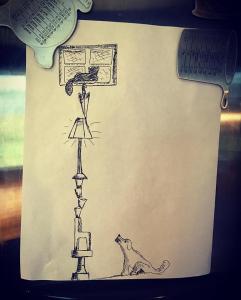Mere moments after listening to the fading dulcet tones of the Esolen Out of the Ashes book, I clicked play on The End of Average by Todd Rose, which I came to know about at the recommendation of my dad who is always thinking about pedagogy and how to get students through difficult academic work successfully. I should be thinking about this sort of thing too, instead of flying along in a fog of guilt, and have now been twice helped on my way by him. First with a book about learning styles–The ABCs of How We Learn: 26 Scientifically Proven Approaches, How They Work, and When to Use Them–and now this one about what Rose calls Averagism.
I straight up loved this book. It was the felicitous and rare experience of an unknown stranger perfectly describing one’s own life. It’s like he had a photo album of my whole academic “career” which is way too grand a word for the way I bashed through the educational system of our day. I am the primordial Average Person. I wasn’t a terrible student, but I wasn’t that great either. I was, and probably still am–perish the idea of me having to find out for any reason–a terrible terrible test taker. And I was pegged early on as someone who can’t do math. Subsequently I have come to believe that this is probably not true, but that the ordinary, indeed the Average ways of talking about numbers always left me always in a dark cloud of unknowing.
But it’s not just about me, the book is a fascinatingly depressing walk through how we came not only to have the educational system that engenders so much community despair, but also the work culture of today–the sitting at desks doing prescribed and boring tasks with no room for innovation or thought. How did we come to be here? Rose spins out the history but then goes on to show how to beat the “system,” how to practically organize your life and and succeed even when nothing about it suits your individual personality at all.
I probably stepped on some toes by not loving the Esolen book, by complaining that his vision is too nostalgic and also essentially impossible. Reading this book on the heels of that one was the perfect cure I was longing for, and made me feel a kinder regard for Esolen’s vision. Rose pegs particular villains for contributing to the ugliness of the way things are, but in a decently fair way. He is quick to say all the good things that have come about because of our obsession with The Average while nevertheless placing blame squarely on the shoulders of particular people and cultural ideas. But what I liked best was the practical application for climbing out of the wreckage. It’s not just Be Better, Be More Virtuous, but rather Take People As They Actually Are. But not in an impossible to enact way. Rather with actionable steps and places of where his vision is actually happening.
Strangely, even though Rose is not a Christian (as far as I know) and doesn’t probably share any of my political inclinations, I found the book to be soothingly pro-life–pro women, pro men, and certainly pro children. It’s very unlikely that women are going to leap up and go back to keeping house full time. I don’t even know if we would want them to. But by taking each person as he or she is, we might be able to build new and better systems that allowed for, say, female fertility, for male competitiveness, for human frailty. Heck, I might even find a chair that would let my feet finally reach the floor.












